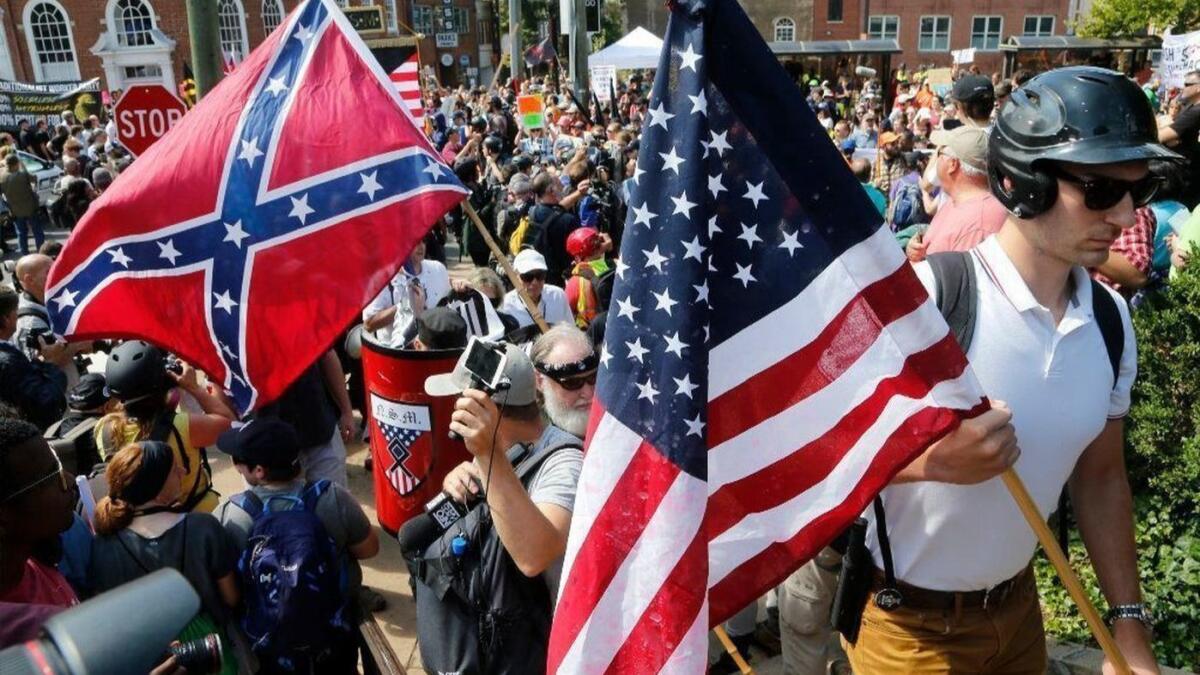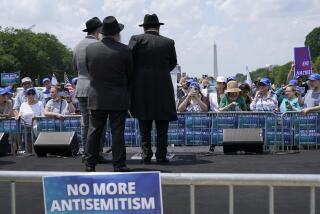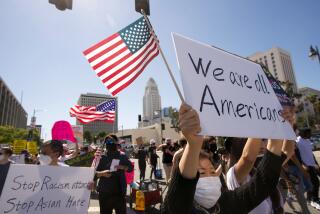Attacks on religious and racial minorities fueled sharp rise in hate crimes in 2017, FBI says

Hate crimes rose in the U.S. by more than 17% in 2017, fueled by increases in attacks against religious and racial minorities, according to a report the FBI released Tuesday.
It is the biggest annual increase in reported hate crimes since 2001, when attacks on Muslims surged in response to the Sept. 11 attacks, and the third straight year that hate crimes have gone up.
The count, which drew on data submitted by more than 3,000 law enforcement agencies, documented a total of 7,175 hate crimes in 2017. The tally was 1,054 higher than the year before. It included a 37% increase in anti-Jewish crimes, a 24% increase in attacks on Latinos and a nearly 16% rise in crimes against African Americans.
In California, hate crimes increased by more than 17% to 1,095, while Los Angeles showed a 16% jump to 263. Race-driven crimes were the most common in the state, followed by attacks on sexual orientation and religion.
In a statement, acting U.S. Atty. Gen. Matthew Whitaker said the report was a “call to action — and we will heed that call.”
“The Department of Justice’s top priority is to reduce violent crime in America, and hate crimes are violent crimes,” he said. “They are also despicable violations of our core values as Americans.”
The report is the first federal calculation of hate crimes that largely took place since Donald Trump became president. In his nearly 22 months in office, Trump has repeatedly defended himself against accusations that he has emboldened hate groups with his rhetoric and policies concerning immigrants, Muslims and others.
In his first year, President Trump faced criticism for being slow to condemn high-profile attacks against minorities, relenting only after intense public pressure. Incidents included the fatal shooting of an Indian immigrant in a Kansas bar by a man who yelled, “Get out of my country!” a rash of bomb threats against Jewish community centers, deadly stabbings of two men who defended women from racist and anti-Muslim threats on a Portland, Ore., train, and a white supremacist rally in Charlottesville, Va., that the president said included “some very fine people on both sides.” Assailants in each case have faced federal or state criminal charges.
Yet for those looking for evidence of a bump in hate crimes under Trump, experts said that the FBI numbers can’t prove it one way or another.
“Unfortunately, the FBI data are probably the best indicators of hate crime that we have,” said Jack Levin, a criminologist at the Brudnick Center on Violence and Conflict at Northeastern University. “I say unfortunately because they are not very good.
“The FBI vastly undercounts hate crimes,” he said. “We’d like to be able to compare the number of hate crimes year by year. We’d like to see trends over a long period of time. The problem is that every year different jurisdictions report.”
In a news release, the FBI suggested the hate crime numbers shot up in 2017 because of better reporting by police departments.
“Although the numbers increased last year, so did the number of law enforcement agencies reporting hate crime data — with approximately 1,000 additional agencies contributing information,” the FBI statement said.
But experts said that alone does not account for the growth.
“These historically large and almost across-the-board increases cannot simply be attributed solely to greater reporting efficiencies,” said Brian Levin, director of the Center for the Study of Hate and Extremism at Cal State San Bernardino.
There are more than 16,000 law enforcement agencies in the country, and they report hate crime numbers to the FBI voluntarily. In the count released Tuesday, more than 14,000 agencies did not report data or told the bureau there were no hate crimes in their jurisdictions. Others vastly under-reported hate crimes.
In 2017, the city of Miami reported zero hate crimes, while Miami-Dade County reported one. Of the 28 law enforcement agencies the FBI requested numbers from in Mississippi, 27 reported zero hate crimes or did not respond. The one that replied said there was one hate crime during the year.
Charlottesville, Va., the site of one of the biggest hate group gatherings last year, reported only one hate crime.
Olathe, Kan., the location of last year’s deadly shooting of an Indian-born engineer after a man yelled at him about his immigration status, reported zero hate crimes.
Another factor that makes it harder to analyze FBI data is the changes in the bureau’s hate crime categories since the report’s first annual release in 1992. The FBI defines a hate crime as a “criminal offense against a person or property motivated in whole or in part by an offender’s bias against a race, religion, disability, sexual orientation, ethnicity, gender, or gender identity.” But crimes against Hindus, Sikhs and Arabs have only been counted since 2015.
The FBI’s data also conflict with the Justice Department’s National Crime Victimization Survey, which estimates there are 250,000 hate crimes each year in the U.S. That count doesn’t include intimidation and vandalism incidents, which are included in the FBI’s hate crimes report.
Another problem is that victims don’t always call the police.
“We believe some individuals, such as LGBTQ people, Muslims and Latinos are not always inclined to report hate crimes because they may mistrust the police or fear being outed,” said Jonathan Greenblatt, chief executive of the Anti-Defamation League.
That, coupled with low FBI numbers, is why the ADL and other civil rights groups do their own bias incidents tracking. The ADL, which uses news reports and calls to its regional offices in addition to criminal reports to compile its data, has found anti-Semitic incidents on the rise since 2013. The biggest annual jump came last year, when the tally climbed 57% to 1,986.
The FBI’s new report found there were 938 hate crimes against Jewish people, who tend to be the most frequently targeted in crimes that are motivated against religion.
Whitaker, who replaced Atty. Gen. Jeff Sessions after Trump ousted him last week, said he was “particularly troubled by the increase in anti-Semitic hate crimes.”
“The American people can be assured that this department has already taken significant and aggressive actions against these crimes and that we will vigorously and effectively defend their rights,” he said.
Overall, offenses motivated by racial prejudice have routinely made up the majority of hate crimes, with blacks being the most frequently targeted race. In 2017, the FBI’s report showed 2,013 hate crimes against blacks.
While most types of hate crimes the FBI tracked increased, anti-Muslim incidents fell to 273 from 307 in 2017. The number was still higher than historical averages. Anti-Muslim attacks grew by more than 90% between 2014 and 2016, according to the FBI.
The bureau’s count of hate crimes in California matched that of a July report from the state’s attorney general’s office. The California report showed a third year of growth in hate crimes after seven years of decline.
Like the FBI report, California’s was based on information provided by police departments, and it showed a majority of crimes were based on racial bias. About 27% of those cases targeted black people.
But the question of whether police departments accurately report hate crimes has also come up California, where 277 law enforcement agencies told the FBI that no hate crimes took place last year.
Anaheim, a city with a population of nearly 350,000 people, reported just two hate crimes to the FBI in 2016 and 2017. The city was home to a violent Ku Klux Klan rally in 2016 that turned into a street brawl where several people were stabbed.
Oren Segal, director of the ADL’s Center On Extremism, said it has analyzed the FBI’s data and found that 92 cities with populations of more than 100,000 people did not report hate crimes to the FBI last year or said that there were none.
“The current data collection is woefully inadequate, and does understate the gravity of the crimes,” Segal said. “This data is not just for the sake of collecting data, but it informs public response to issues of hate, which has never been more important.”
Times staff writer James Queally contributed to this report.
UPDATES:
1:30 p.m.: This article was updated with details on hate crime statistics and additional analysis of the FBI hate crimes data.
This article was first published at 7:25 a.m.
More to Read
Start your day right
Sign up for Essential California for news, features and recommendations from the L.A. Times and beyond in your inbox six days a week.
You may occasionally receive promotional content from the Los Angeles Times.







